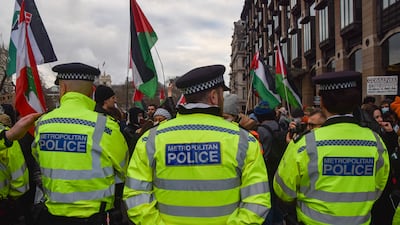The British government unveiled this week its proposed definition of what “extremism” apparently means, which it purports should become the basis for excluding groups and individuals from state funding, as well as top official engagement.
There is extremism we need to be aware of, without question. I was previously appointed by the UK government to be deputy convenor of its working group on “tackling extremism and radicalisation”, and I take the issues of extremism, radicalisation and terrorism very seriously. But the newly announced definition does not help the necessary work Britain needs to do in order to face down these threats. On the contrary, it makes the work more difficult, and, potentially, aids in even more extremism.
The government’s definition purports that extremism is the promotion or advancement of an ideology that seeks to “negate or destroy” individual rights and freedoms; or seeks to undermine or replace the UK’s system of democracy; or wants to create an environment that permits others to do either of the former two.
There is a reason why the UK’s political and legal systems have been so careful about defining extremism for so long – because the attempts thus far have been utterly unworkable and open to abuse. This latest endeavour is no different.
When it comes to “terrorism”, Britain’s political elite managed to come to a definition that has, more or less, held up in the face of the judiciary and other legislation. It was not easy to do, and there continues to be challenges, but it has managed to do the job. When it comes to defining “extremism”, however, the very notion is so incredibly subjective, any partisan political effort is going to be ideologically bound. Good policy, however, relies on impartiality and consistency. This definition is neither.
In a practical sense, how will this definition be applied? How is “undermine” to be defined, for example? In the definition, the rights suggested relate to the Human Rights Act of 1998 – but at one point, the Conservative government was discussing proposals to abolish the Human Rights Act. Is the government thus guilty of extremism? There is the point about “replacing” the UK’s system of democracy; does the abolition of the monarchy, or the House of Lords, qualify in this regard? Will republicans thus be targeted under this kind of definition?
Common sense suggests that the answer to both questions would be “no” – but that is part of the problem. The policy is so poorly constructed that such scenarios are actually entirely in keeping with the wording, and it would only require political will to push them forward. It is why, for example, even several senior Conservative politicians, who each served as home secretary, opposed the very process that led to this definition. Other politicians, like Lord Peter Hain of the Labour party, noted that such a definition could “probably have been applied to the suffragettes in their day”.
The reality is, of course, that the definition has less to do “extremism”, and more to do with something far more base in nature. The definition isn’t about security challenges; it is about culture wars. The UK’s Conservative party is well aware that a sizeable proportion of its voters are, for lack of a better word, tribalistic; right-wing populism has become an incredibly attractive tool by which to get their attention and hold their support. In the midst of that culture war between the populist right and the rest, many regrettable policy decisions are taken.
Note, for example, how just recently, the deputy chair of the Conservatives, Lee Anderson, expressed Islamophobic remarks about the Muslim mayor of London; the party refused to admit that the remarks were, indeed, Islamophobic. But they suspended Mr Anderson from the party, and the reaction was telling. The leadership’s refusal to call out the comments for what they were – Islamophobic – was not enough to hold the backing of much of the party’s voting base, who expressed not only support for Mr Anderson, but anger at his suspension. The end result: Mr Anderson went to the more right-wing Reform Party, which is competing with the Conservatives for the same voter base.
To be blunt, that part of the voter base is not simply conservative; it is sympathetic to identitarianism and racist politics. It is why, for example, the Conservatives took so long to condemn as racist the remarks of a Conservative donor, Frank Hester, who had been offensive about a black Member of Parliament, referring in particular to her skin colour. Eventually, they did – but they also refused to return the money he had provided the party. Even now, Mr Anderson’s comments haven’t been described as Islamophobia. There are numerous other examples, particularly when it comes to Muslims and ethnic minorities. The sad reality is that the Conservatives have embraced one set of extremists who are inclined to racism and bigotry and, ironically, have created an “extremism” definition to placate that set of extremists.
With that context in mind, it is clear the extremism definition is not only coming into being as a result of the culture wars – but that it is likely to be a tool used within the culture wars. The extremism definition is likely to be aimed disproportionately at Muslim groups, especially given who the progenitor of the definition is: Michael Gove, a Conservative politician who has long been infamous for public statements that target and problematise British Muslim populations. Moreover, the taking-up of valuable resources to implement any policy based on this definition is going to take up capacity that is incredibly limited, rather than focus such capacity where it is needed.
Muslim Britons will bear the brunt of this regrettable and entirely avoidable mistake – but we should not fool ourselves. As we let these culture wars play out, Britain itself has lost a battle. The irony is that some Britons think they just won one instead.


